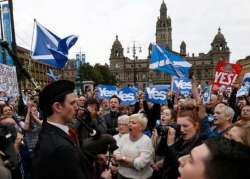Edinburgh : To be or not to be , the famous soliloquy in William Shakespeare's play Hamlet must be the dominating thought in the minds of millions of Scottish people who camer out in open to decide the future of Scotland. By 9.30 a.m. IST Friday at around breakfast time, it will be known whether Scotland will remain a part of the United Kingdom or become independent. The vote is on a knife's edge.
Polls opened across Scotland on Thursday morning in a referendum that will decide whether the country leaves its 307-year-old union with England and becomes an independent state. The referendum could witness an unprecedented turnout of voters for Scotland. Nearly 4.3 million people have registered to vote, which translates to 97 percent of those who are eligible to do so.
As they enter a polling booth, the question the voters are asked is: “Should Scotland be an independent country?” The answer had to be “Yes” or “No”.
Queues not seen before snaked out of the 5,579 polling stations established for the purpose. Counting of votes will begin soon after the booths close at 2.30 a.m. IST.
Karthik Subramanya, president of the Scottish Indian Arts Forum, said: “From an Indian point of view, clearly a vast majority are backing the ‘No' campaign as they see more risk and not sufficient emotional reward.”
The leader of the “Yes” campaign and Scottish Nationalist Party leader Alex Salmond, and the unofficial standard bearer of the “Better together” crusade Gordon Brown were out early to cast their votes. But pictures of them outside polling stations were all that could be depicted by media, as sound bytes or any reporting of campaigning were debarred on voting day.
The most recent opinion survey published Wednesday night by You-Gov projected “No” supporters at 50 percent and “Yes” supporters at 45 percent, with the rest being “don't knows”.
British politicians and media began analysing the scenario if Scotland voted ‘Yes' to end it's over 300-year-old union with the UK in the to independence referendum on Thursday that has aroused excitement and anxiety across the country.
Political leaders on both the sides have expressed confidence in the Scottish people, but uncertainty ripples below the surface.
In the short-term, British Prime Minister David Cameron would have most to lose if Scotland votes to leave the UK.
Some Conservative MPs believe he could even lose his job, according to The Independent.
Yet in the medium-term, a ‘Yes' verdict could have a much more dramatic impact on Labour than the Tories.
It currently holds 41 of Scotland's 59 constituencies—which would no longer send MPs to Westminster after ‘independence day', which is due to happen in March 2016 on Alex Salmond's timetable.
Even a ‘No' vote would pose problems for Labour.
If Scottish MPs were excluded from voting on ‘English laws', as Tory MPs are already demanding, some Labour folk worry whether a Labour government would ever get a Budget approved by the House of Commons.
Whatever the result, British politics will change dramatically after the referendum.
Opinion polls have failed to put either side decisively ahead. The latest polls indicated that the result remains too close to call and that the last-minute efforts were geared towards wooing undecided voters. They all seem to suggest a lead for ‘No' at 52 per cent to 48 per cent for ‘Yes' to independence.
It might be interesting to note that oil revenues and reserves have been at the centre of Scotland's referendum debate.
The United Kingdom produces more than 75 percent of the European Union's offshore oil production, of which 90 percent is extracted from Scottish waters, according to the European Commission's Joint Research Centre.
Based on 2012 figures, the Scottish government says this Scottish oil contributes around 24.4 billion British pounds (39.5 billion US dollars) to the UK economy.
Latest World News

